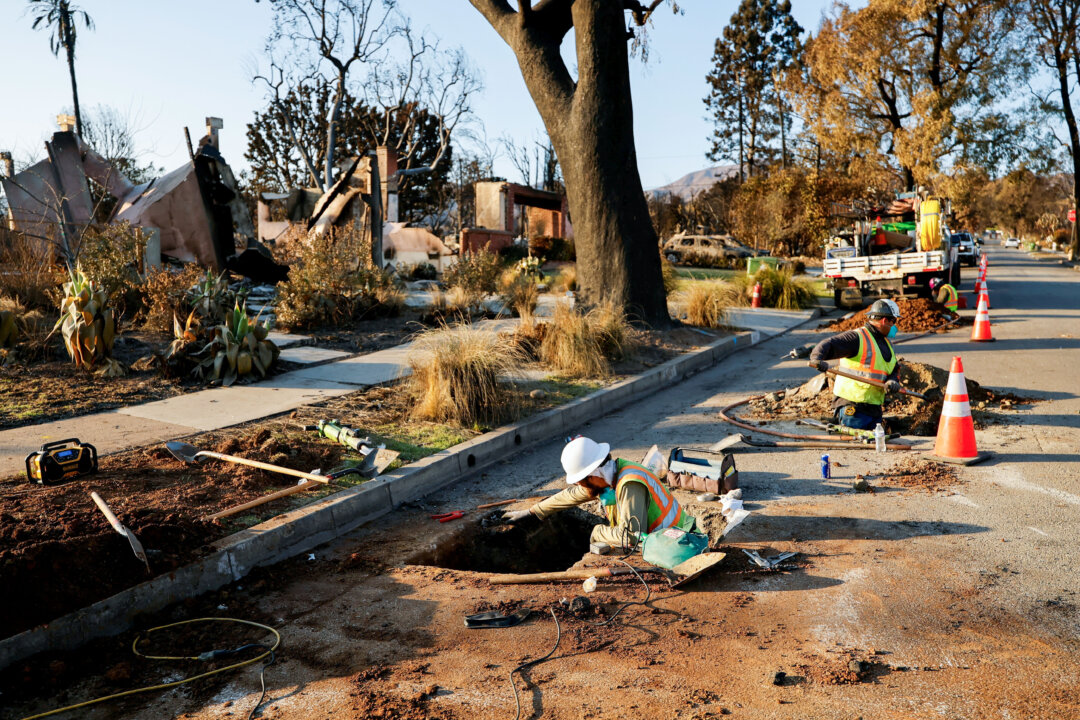‘It would be better if I went as president,’ Trump said, after considering an earlier visit.
President-elect Donald Trump said on Sunday that he will visit the Los Angeles area—which wildfires have scorched since early January—on Friday following his Monday inauguration ceremony.
As of Jan. 17, the fires have killed at least 27 people and destroyed more than 10,000 structures in the Pacific Palisades and Altadena residential boroughs. Last week, officials estimated that more than 12,000 structures in total had been damaged or destroyed throughout the Los Angeles area.
“Tonight I also want to send our love to everyone affected by the terrible wildfires raging in California. We are praying for you all. We love you all. We’re going to be there very soon. I’m going to go out there on Friday to see it,” Trump said at his victory rally in Washington. “And to get it moving back, we are going to get some of the best builders in the world. We are going to get it moving back.”
Trump told NBC in a Saturday interview that he had considered visiting California on the previous day, but decided “it would be better if I went as president.”
“It’s a little bit more appropriate, I suspect,” he said.
Throughout the nearly two weeks of devastation, Trump criticized California Gov. Gavin Newsom, suggesting his policies led to water shortages that hamstrung fire-relief efforts. Newsom dismissed Trump’s claims and invited him to visit the area last week.
People should not “politicize human tragedy or spread disinformation from the sidelines,” Newsom said.
Trump also criticized Los Angeles Mayor Karen Bass for her response to the fires and suggested his predecessor President Joe Biden had left the Federal Emergency Management Agency budget without sufficient funds.
Beginning on Jan. 7, the wildfires grew exponentially amid dry conditions and intense Santa Ana winds, which reached upwards to 80 mph—hurricane strength—in some areas of San Bernardino County earlier this month. The National Weather Service issued a red flag warning last week after wind gusts reached 70 mph in the mountains around the Los Angeles area.
Authorities told most evacuees on Jan. 16 to avoid their homes for at least another week. Estimates for the total damage range from $20 billion to $40 billion, with rental rates surging and many residents left in limbo over uncertainty with insurance settlements.
Private forecaster AccuWeather has put the total damage and economic losses in a range between $250 billion and $275 billion. That would make the wildfires the costliest natural disaster in the nation’s history, far outpacing Hurricane Katrina in 2005.
Since April 2024, Southern California has been deprived of any appreciable rainfall, leading to dry brush that acts as tinder for the rough Santa Ana winds reaching out from the deserts and projecting embers upwards to 2 miles ahead of the fires.
With entire neighborhoods leveled and reduced to smoldering ash and rubble, many homes are left with just a chimney standing.
“It’s one thing to see it on television. It’s another thing to see it from the air. The massive, massive destruction is unimaginable until you actually see it,” Bass said in a press conference last week after taking an aerial tour of the devastation.
Roughly 89 percent of the damaged or destroyed residences are single-family homes, real estate company Redfin said on Friday. Another 11 percent of affected residential units were multi-family properties, with less than 1 percent being mobile homes.
Reuters contributed to this report.

